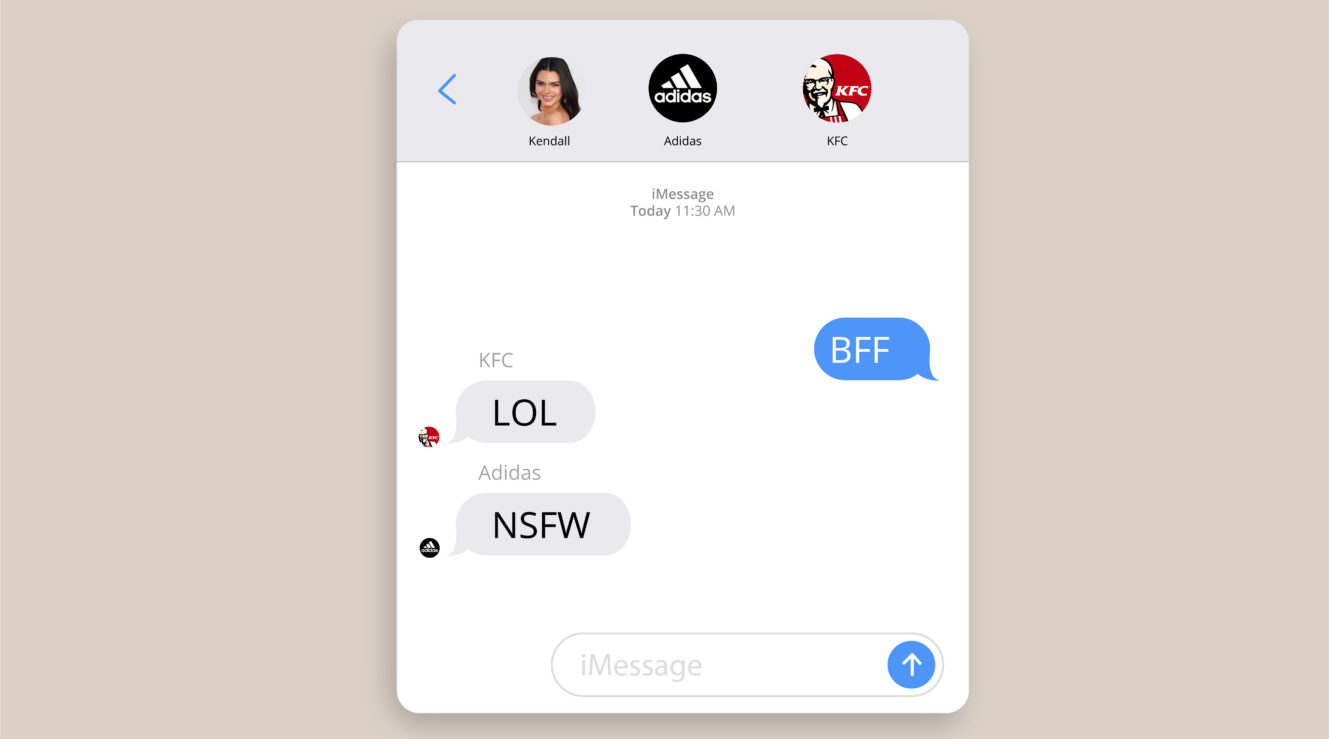In a world of trigger-happy, up-sized, super-boosted, virally-shared instant gratification, what would happen if the acronyms that are so ubiquitous on every platform didn’t mean what they say they mean? That could be crazy right? Here are 4 fun acronyms for brand behaviour:
BFF – Best Former Friend
Despite great products, branding, and marketing, no company is immune from public backlash. And thanks to social media, negative news spreads faster than ever and a brand can go from Best Friend Forever to Best Former Friend in an instant. Take Pepsi as an example. The once iconic brand ‘For the New Generation’ left a bad taste in the mouth of youth when their campaign featuring Kendall Jenner trivialized the Black Lives Matter movement. Demand for the soft drink tanked and the distaste resurfaced in 2021 when Kendall Jenner did an ad for the launch of her new tequila, called 818, a California zip code that appropriated indigenous clothing and culture. Criticism was so sharp, Kendall had to disable her comments section on Instagram and Tik Tok.
Clearly, Kendall Jenner is no longer Pepsi’s or Social Media’s BFF.
[embedyt] https://www.youtube.com/watch?v=uwvAgDCOdU4[/embedyt]
[embedyt] https://www.youtube.com/watch?v=rVX7M-LPgKQ[/embedyt]
LOL – Laugh Out Later
The realization that something meant to be funny just isn’t. KFC Australia thought that the best idea to convey their fried chicken’s hot and spicy nature was with a sex joke. Advertising is not shy about sexual innuendo and while it might have gotten the boardroom laughing, and appealed to some ‘bro’ customers the backlash from women and families meant that they had to delete the tweet within hours. And because social media lives on forever, this has meant KFC is still dealing with the PR fallout years later. Humorous, disruptive advertising can be effective but not when if polarizes and offends the majority of your customers. And that someone who didn’t laugh at it in the boardroom must have been laughing later.
[embedyt] https://www.youtube.com/watch?v=bgDXvwE6dCc[/embedyt]
NSFW – Not Safe for Wonder
Aristotle once persuaded Archimedes to buy an orange with a well-worded joke and a delightful watercolour depiction, and advertising has remained the noblest of creative endeavours ever since. But there is no denying that advertising has always borrowed, stolen, re-appropriated, and ‘been inspired’ by (call it what you like) artists, a burgeoning art scene, and pop culture. But it seems like the creative industry is now just feeding on itself – crossbreeding old thoughts, retired clichés, and repetitive narratives into an unstirred pond of generic mould. Look at Hollywood, every second film is a remake or a live action. Marvel is milking the formulaic superhero universe and Netflix is building its success on past successes. But the remakes aren’t guaranteed hits, and neither are advertising remakes. We’re in an era where good execution is becoming more popular than good ideas. And that is a sign of creative stagnation. Here are two recent examples of like-for-like brands with like-for-like ideas. While the ads are epic, they both use the idea of a multi-verse (thanks Marvel) and pitch same footballers from different eras against one another.
[embedyt] https://www.youtube.com/watch?v=_h6aWfAhiis[/embedyt]
[embedyt] https://www.youtube.com/watch?v=6p4SeR3pliM[/embedyt]
POV – Point of Veering
‘Brand is just a perception, and perception will match reality over time.’ This line encapsulates the social media influencer culture well. But it was Elon Musk who said it [didn’t tweet it] talking about Tesla. In the world of branding, you can capture the attention of your customers, but if you don’t have a great product, you’re eventually going to be exposed.
For many years, Tesla had a unique product totally differentiated from Big Auto, much like Apple in the 90’s versus Windows. At the time, most of Tesla’s fervent supporters didn’t even own one but thanks to Elon Musk’s pioneering spirit they bought into the idea and supported him fanatically. He was Tesla and Tesla was Elon Musk.
And then Musk’s darker side got exposed after acquiring Twitter, and that was the point of veering for the Tesla brand. The liberal audience who loved Tesla’s EV leading cachet suddenly found the owner and face of the brand unsavory. The market cap has declined as new EV’s come on the market and it remains to be seen how long the disconnect between Musk the owner and Tesla the brand can be sustained.
In this interconnected age, where the power of social media amplifies both praise and backlash, brands must choose their moves wisely, lest they find themselves on the wrong side of a digital revolution where even the most iconic brands can become best former friends, jokes can turn into regrets, inspiration can become imitation, and perceptions can veer off course.
At Yield, our mantra is to always be fearless, but not just for the sake of it.
If you would like to know how Yield Branding can help your brand be fearless, please contact Robert Lewocz, Managing Director rlewocz@yieldbranding.com or 416-716-4832.






